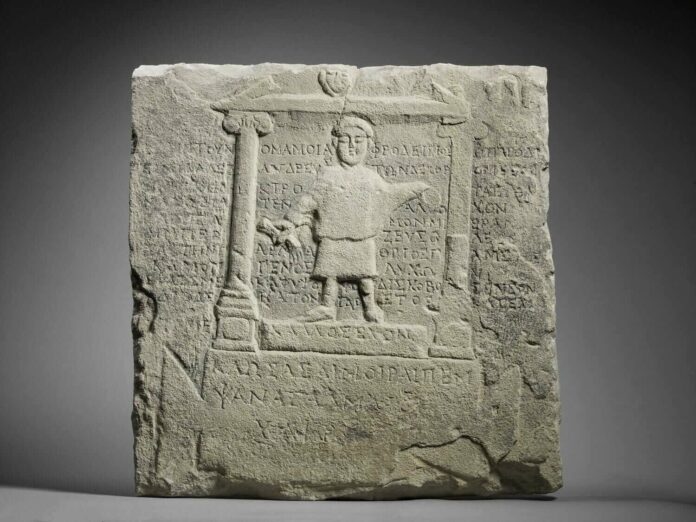A Betrayal from Beyond the Grave
Epitaphs, the solemn phrases inscribed on tombstones, have traditionally served to commemorate those who have passed. Yet, in an extraordinary and scandalous case, the epitaph of Aphrodisios of Alexandria Troas narrates a chilling tale of treachery, desire, and murder, now preserved within the walls of the Louvre.

The Shocking Inscription
The words on the tombstone unfold like a gripping narrative straight from the pages of an ancient Greek tragedy: “Passer-by, my name is Aphrodisios; I hail from Alexandria Troas and lead the chorus. I suffer a wretched fate due to my wife, the vile adulteress (whom Zeus will annihilate). Her clandestine lover Lychon—who is of my own kin!—murdered me in my youth. He hurled me from heights like a discus. At just twenty years old, bursting with beauty, the Moirai wove my destiny and delivered me as a treasure to Hades.”

A Life Cut Short by Betrayal
Aphrodisios, a young man of stature in the vibrant city of Alexandria Troas, met a brutal and premature end at the hands of his wife’s lover, shockingly revealed to be a relative. The epitaph vividly depicts this betrayal, with Lychon casting Aphrodisios down from a great height “like a discus.”
The Cursed Adulteress and Zeus’s Fury
With dramatic flair, the epitaph invokes the vengeance of Zeus upon Aphrodisios’ “vile adulteress” wife, whose infidelity sparked this tragic sequence of events. The mention of the Moirai, the Fates from Greek mythology, lends an air of inevitability to the young man’s premature demise, consigning him as a “delight to Hades” at the tender age of twenty.
A Legacy of Shame
What distinguishes this epitaph from more traditional tributes is its stark and unvarnished depiction of personal tragedy. Instead of upholding the dignity of the deceased, it exposes the most intimate and scandalous aspects of Aphrodisios’ life for all to see.

In a time when public expressions of personal grievances were uncommon, this tombstone serves as a testament to the ancient Greeks’ capacity for embarrassment and their readiness to enshrine even the most disgraceful tales. For Aphrodisios, his epitaph guarantees that his tragic saga of betrayal and murder will echo through generations, creating a lasting yet mortifying legacy.

